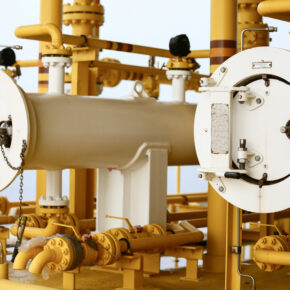
Posted on: 07. 11. 24
Pipelines are the lifeblood of the energy industry, transporting natural gas, oil, and other fluids across vast distances. However, the integrity of these pipelines is constantly under threat from corrosion. In this article, we will explore the crucial role that dehydrators play in safeguarding pipelines from this silent destroyer.
Understanding Pipeline Corrosion
Corrosion is a natural process that occurs when metals react with their environment, gradually deteriorating over time. In the case of pipelines, several factors can contribute to corrosion, including:
Moisture: Water is a primary culprit in pipeline corrosion. It reacts with the metal, forming rust and weakening the pipeline’s structural integrity.
Oxygen: When oxygen comes into contact with the pipeline’s interior, it accelerates the corrosion process.
Acids: Certain gases, like hydrogen sulfide and carbon dioxide, can dissolve in water and create acidic conditions that corrode the pipeline.
The consequences of pipeline corrosion can be severe. Corrosion can lead to leaks, ruptures, and even catastrophic failures. This not only poses significant environmental risks but also jeopardizes the safety of communities and disrupts energy supplies.
What Are Dehydrators?
Dehydrators are specialized equipment designed to remove moisture from natural gas and other fluids transported through pipelines. They work by absorbing water vapor from the gas stream, effectively drying it before it enters the pipeline. Several types of dehydrators are commonly used in the industry, including:
- Glycol Dehydrators: These dehydrators use triethylene glycol (TEG) as a desiccant to absorb water vapor.
- Solid Desiccant Dehydrators: These dehydrators utilize solid materials, such as silica gel or activated alumina, to adsorb water vapor.
- Membrane Dehydrators: These dehydrators use semi-permeable membranes to separate water vapor from the gas stream.
How Dehydrators Prevent Pipeline Corrosion
The primary function of dehydrators is to remove moisture, the leading cause of pipeline corrosion. By keeping the gas stream dry, dehydrators create an environment that is less conducive to corrosion. This significantly reduces the risk of rust formation, pitting, and other forms of corrosion that can weaken the pipeline.
Furthermore, dehydrators can also help prevent the formation of hydrates, solid ice-like structures that can block pipelines and impede the flow of gas. Hydrates form when water vapor combines with natural gas under certain temperature and pressure conditions. By removing water vapor, dehydrators inhibit hydrate formation, ensuring smooth and uninterrupted gas transportation.
Benefits of Using Dehydrators
The benefits of using dehydrators in pipeline operations are manifold:
Enhanced Pipeline Longevity. By preventing corrosion, dehydrators extend the lifespan of pipelines, delaying the need for costly replacements.
Improved Safety and Reliability. Dry pipelines are less prone to leaks and ruptures, improving the overall safety and reliability of pipeline operations.
Cost Savings. Dehydrators can help reduce maintenance and repair costs associated with corrosion damage.
Best Practices for Using Dehydrators
To maximize the effectiveness of dehydrators in preventing pipeline corrosion, it is essential to follow best practices:
Proper Installation and Maintenance
Ensure that dehydrators are installed correctly and maintained according to manufacturer recommendations. Regular inspections and maintenance can help identify and address potential issues before they escalate.
Monitoring and Regular Inspections
Monitor the performance of dehydrators regularly to ensure they are operating efficiently. Conduct routine inspections to check for leaks, blockages, or other problems that could affect their performance.
The Role of Pro-Gas Services LLC
Pipeline corrosion is a significant challenge that threatens the safety and integrity of energy infrastructure. However, with the help of dehydrators and other corrosion prevention measures, pipeline operators can effectively mitigate this risk.
By investing in dehydrators and implementing best practices, operators can ensure the longevity, reliability, and safety of their pipelines, ultimately safeguarding the environment and ensuring uninterrupted energy flow.
Pro-Gas Services is a trusted partner in the fight against pipeline corrosion. The company offers a comprehensive range of dehydrators, including glycol dehydrators, solid desiccant dehydrators, and membrane dehydrators. These dehydrators are designed to meet the specific needs of various pipeline applications, ensuring optimal performance and reliability.
In addition to dehydrators, Pro-Gas LLC also provides a wide array of other equipment and services that can contribute to pipeline corrosion prevention. These include:
- Filter Separators: These devices remove solid particles and liquid droplets from the gas stream, preventing them from accumulating and contributing to corrosion.
- Inhibitors: These chemicals are injected into the pipeline to form a protective barrier on the metal surface, inhibiting corrosion.
- Corrosion Monitoring: Pro-Gas offers corrosion monitoring services to detect and assess the extent of corrosion in pipelines, allowing for timely intervention and repairs.
By partnering with Pro-Gas Services LLC, pipeline operators can access a wealth of expertise and cutting-edge solutions to protect their pipelines from corrosion. The company’s commitment to quality, innovation, and customer service makes it a preferred choice for many in the industry.
Pro-Gas LLC is dedicated to providing the tools and expertise necessary to combat pipeline corrosion. Contact us today to learn more about our dehydrators and other solutions designed to protect your pipeline assets.


